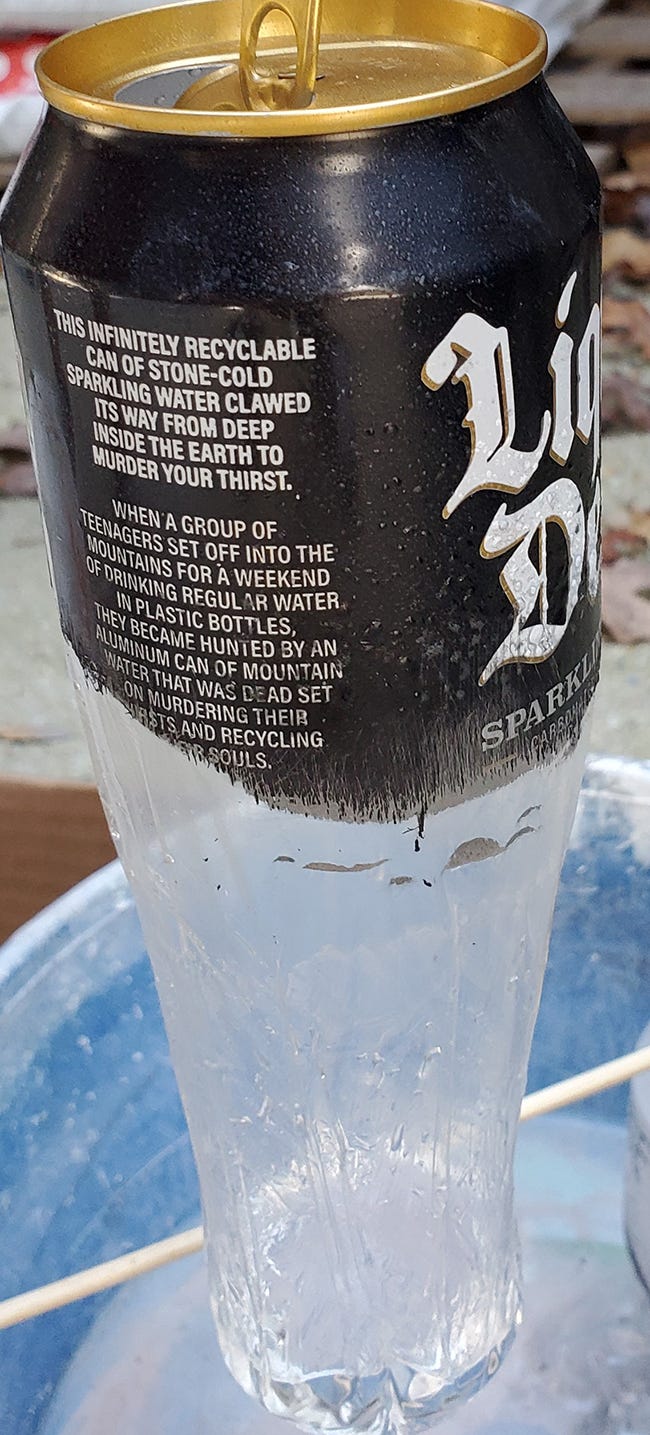Liquid Death May ‘Murder Your Thirst,’ but It Won’t Kill Plastic, No Matter What the Ads Say
The brand’s #deathtoplastic hashtag has been a successful marketing tool, but the company doesn’t exactly practice what it preaches.
March 22, 2024

Even if you have not tried Liquid Death, you may have heard about its recent blockbuster billion-dollar valuation or at least seen cans of the trendy beverage, which spikes its advertising with a dark sense of humor. The company claims that its liquids will “Murder Your Thirst,” coming in flavors such as “Berry it Alive” and “Rest in Peach.” (I seriously enjoy the puns, even though I’ve never bought any of the products.)
Regardless of the product, they all share:
the ubiquitous #deathtoplastic hashtag;
a promise that a portion of profits will help kill plastic pollution (although I can’t find any information that shows this is actually happening);
some statement about the infinite recyclability of the aluminum can.
Hypocrisy and gut rot, which is to say, greenwashing. The makers of Liquid Death are appealing to your emotions and aren’t making much of a contribution to a solution.
Liner notes
Let’s start with the aluminum cans. Just like every other aluminum can, they have a plastic liner. Here’s a picture I took of one after dissolving the aluminum and exposing the liner.

All aluminum cans have a plastic liner that can be easily exposed. Image courtesy of John Spevacek.
There are plenty of videos on YouTube showing how to do this yourself. A pretty good one is embedded at the end of this article. As much as Liquid Death is trying to convince you that its cans are an alternative to plastic, it still can’t escape the “plastic monster.”
The shipping boxes used by Liquid Death are glued shut (adhesive = polymer), and I can’t imagine the company doesn’t use plastic shrinkwrap on its pallets. This all adds further to the plastic trail left behind. If you’re drinking a can of Grim Leafer while shredding a double-black-diamond run in the Colorado “wilderness,” you are contributing to plastic waste.
Why aluminum cans are never made from 100% recycled content
Let’s look more closely at aluminum. Liquid Death claims that aluminum is infinitely recyclable, yet its cans — and everyone else’s beverage cans — never state that they are made from 100% recycled content. We see statements about recycled content for cardboard and other products, but never for beverage cans. Why is that?
It’s because the “closed loop” for recycling aluminum isn’t as closed as you’ve been told. Even if the plastic liner wasn’t there, a recycled aluminum can won’t be melted down and reformed into a new can. It’s made from two different types of aluminum alloy — the top is one alloy and everything else is a different alloy. If you melt the entire can, the resulting mix isn’t good for either application. Additional aluminum alloys from somewhere else need to be added to the melt so that it can be used again.
Whatever happened to the Evercan?
Novelis is the largest recycler of aluminum in the world. In 2014, it introduced the Evercan made from 90% aluminum (confirming that 100% recyclability is impossible). Despite plenty of media coverage and an internal commitment by Novelis to exclusively produce Evercans by 2017, there has been no news coverage since 2015 or so. Searching for Evercan on the Novelis website produces no hits, which suggests that it really didn’t work out as planned.
Liquid Death also caused a stir recently on Twitter/X when it introduced powders that you can mix into your own beverage of choice. Why the fuss? The packaging was plastic. Single-use plastic. This is not surprising as paper will not prevent the powder from absorbing humidity and turning into something clumpy (and maybe sticky) that could be tough to handle.
If you enjoy drinking Liquid Death, please continue to do so. I’m not suggesting the company should be cancelled or boycotted. Just realize that you’re not making as much of a positive environmental impact as you think, and that the company’s commitment of “Death to Plastics” is just a sales pitch designed to separate you from your money.
About the Author(s)
You May Also Like




